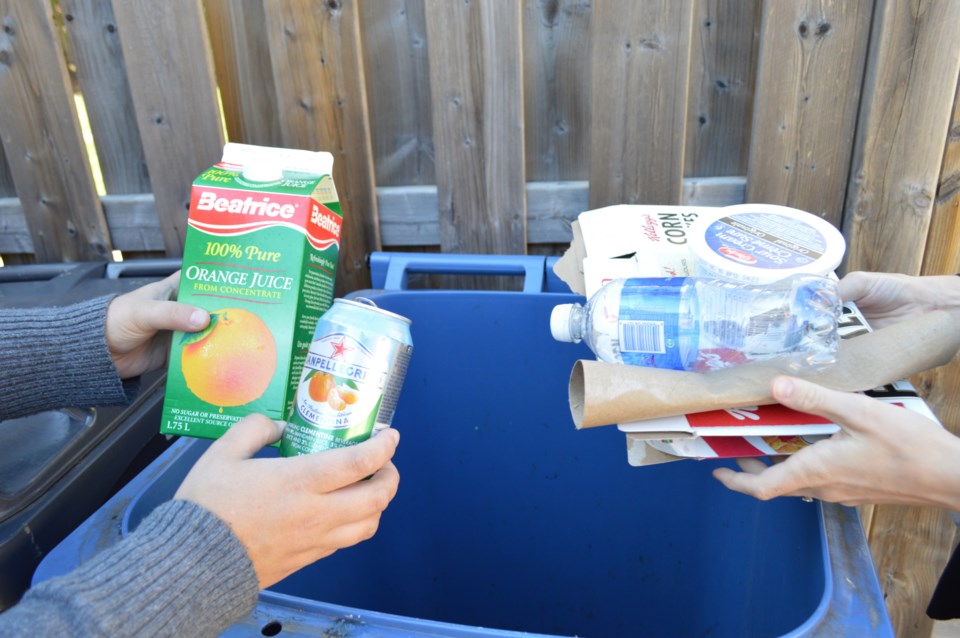A year after being paused, household waste audits are slated to make a comeback in the months ahead. That’s when city workers will take a peek inside random carts on the curb to see if sorting efforts are up to snuff.
If not, residents may find themselves stuck with the waste until everything is where it should be … more or less.
“We know that small amounts of contamination are going to happen,” said Heather Yates, the city’s supervisor of environmental programs. “We have good-performing areas within the city and those that need a little bit more education.”
Guelph adopted three-stream waste collection in 2012, with blue, grey and green bins – recycling, garbage and organics respectively – with residents expected to put items in their appropriate container for pickup.
Soon after, it began the process of doing random inspections.
It’s typically seasonal or co-op students who are brought onboard to review household refuse, Yates said, noting between 150 and 200 households are selected each year. Over a six-week timeframe, each house’s waste bins are visually inspected, resulting in up to 1,200 annual inspections.
“If things go through the system, if we’re not able to separate the items that aren’t properly sorted, it does create that contamination,” said Yates, noting recycling, organics and some items in the waste stream are sold to generate revenue. “It allows us to keep the cost of those services down for our residents.
“If they are in fact contaminated, we’re not getting the same value out of that resource as we would for something that’s properly sorted.”
The first time incorrect sorting is seen, workers leave behind materials that explain what waste goes into which bin. If things look good, they hand out a star sticker with “You’re a good sort!” written on it.
In the case of repeat offenders during an audit’s run, carts with “significant” sorting errors could be left on the curb and not collected.
Audit areas are selected based on collection routes deemed to have the most improperly sorted items, with individual homes selected at random, Yates explained.
“We can really target those education practices and encourage residents and help support residents to properly sort,” she said, adding that because of the way audit areas are selected, it’s not known what percentage of people are doing it right. “The diversion rate … is a really good barometer of how our city overall is performing with our residential programming.”
In a report released last fall, the city announced a 58 per cent household waste diversion rate for 2019. That was the first time household waste had been broken out and reported separately from overall waste.
Figures for 2020 are not yet known, Yates noted.
Previous audits have turned up a number of trends regarding improperly sorted items. They include:
- Putting recyclables in grocery bags, clear blue bags or white bags – should be placed loosely in the blue bin (no bags)
- Using black, white or grocery bags in grey bins – clear bags are needed (assists with audits and additional sorting at the waste management facility
- Use of plastic bags in green bins – items can be placed in the bin loosely or in a certified compostable bag (plastic bags don’t break down during organics processing).
Improperly sorted items commonly include plastic film, food wrappers and pet waste. For a list of which bin things belong in, visit guelph.ca/waste.
Medical waste, including needles, poses a danger to staff, Yates said.
“Just because you throw something out in the waste bin doesn’t mean it immediately goes to a landfill,” she said, noting workers also sort materials by hand. “Hazardous waste and things like that, people are coming in contact with it.”
Needles and lancets should be taken to a participating pharmacy for disposal, or taken to the public waste drop-off location on Dunlop Drive in an approved sharps container. Similarly, unused medications and pharmaceuticals should be taken to a pharmacy for disposal.
Disposable face masks go in the grey bin, Yates added, noting that's a question frequently posed to staff as of late.
